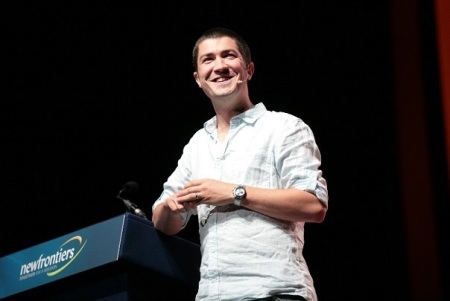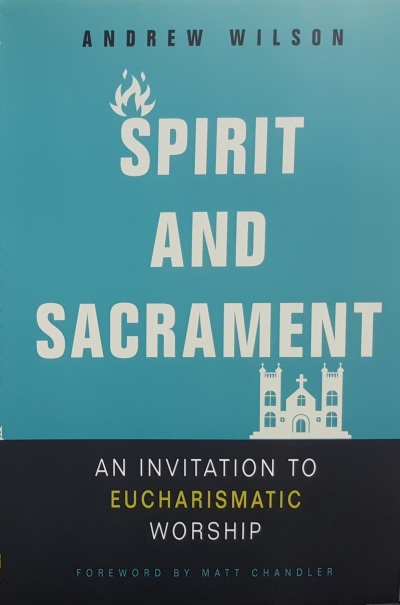Charismatic and liturgical Christians need each other: 'Spirit and Sacrament' author

For far too long, charismatic and liturgical, sacramental Christianity have been divorced, and one British pastor thinks it's high time for a remarriage.
"I have seen and lived through the separation of a charismatic or Pentecostal, very experiential, emotionally engaged, lively, passionate, what you might call 'experimental' Christianity and a very traditional, rooted, rich, historically grounded, catholic with a small c, habit-forming, poetic-artistic tradition," Andrew Wilson explained in a recent interview with The Christian Post.
"There's beautiful poetry and prose in one of them and an awful lot of vibrancy and bounce in the other one," he says.
Wilson is a teaching pastor at Kings Church-London, a charismatic congregation that meets in several locations across the city, and the author of the soon-to-be-released book Spirit and Sacrament: An Invitation to Eucharismatic Worship.
That invitation to "eucharismatic" worship, a phrase he coined blending "Eucharistic," referring to the celebration of the Eucharist (Communion), and "charismatic," which is, as he describes in the book, "a bucket term for any contemporary church that emphasizes the reality of supernatural experiences and the availability of the New Testament gifts of the Holy Spirit to ordinary believers today," aims to bring these seemingly opposite things together.
However different they might appear, these expressions of faith are not and never were mutually exclusive. Eucharismatic is aspirational, not descriptive, Wilson explains, and there is no formulaic prescription for every church aiming for such unity.

"To be Eucharismatic is to have our minds persuaded, and our hearts captivated, by this biblical and historical reality: the Triune God has showered this church with gifts, and every one of them is good. And we will maximize our joy (chara) and our appreciation of His grace (charis) as we receive and treasure all of them.
"It may sound like a tall order. But if the Apostle Paul could envisage the Corinthians, with all their problems, holding fast to the traditions they received, sharing in the Lord's body and blood when they came together and lacking in no spiritual gifts as they waited for Jesus to return, then it should be possible for anyone," he writes in the book.
Spirit and Sacrament casts a vision for what these two vital streams of the church might look like were they to form a single river. Wilson argues that they should have never been split in the first place.
The book was in part born out of Wilson's growing conviction that this significant chasm within the church is neither biblical nor historically defensible. Throughout the book he shares both his heart for what this togetherness might look like in addition to making en exegetical-historical case for their reunification.
"We need both of them. Both the liturgical-sacramental tradition and the charismatic-Pentecostal tradition are ways of receiving and capitalizing on gifts that God has given," Wilson said.
Yet the desire to reunite these two camps cannot come without facing thorny theological conflicts that have plagued Christianity, particularly evangelical Protestantism in the last century.
What is known as cessationism, the belief that the gifts of the Holy Spirit — especially the distinctly supernatural ones like prophecy, the working of miracles, speaking in tongues and their interpretation — died off with the death of the last Apostle, is still held by many influential evangelical theologians in North America and Western Europe. Yet others believe such gifts remain in operation today — known as continuationism — but have lacked a model with which to minister those gifts during public worship, winding up as what some have referred to as "functional cessationists."
In November, at the annual meeting of the Evangelical Theological Society, the theme of which was "The Holy Spirit," Wilson gave a presentation arguing for continuationism, a presentation theologian and Boyce College professor Denny Burk, who is a self-described "convinced cessationist," called "compelling."
Wilson is optimistic that as those like Burk and other cessationists he has debated on the issue watch those who practice the gifts with wisdom will begin to be persuaded that indeed such things are biblical.
For many the concern remains that charismatic Christianity will inevitably devolve into heresy or excess, having witnessed years of the gifts being abused and misused alongside a low view of the sacraments and doctrinal shallowness. But the solution for abuse and misuse is proper use, not disuse, Wilson maintains.
He recounted to CP that Reformed theologian Ligon Duncan, also a cessationist, told both him and Reformed charismatic pastor Sam Storms: "If every charismatic practiced the gifts the way you guys are, I don't think I'd have a problem."
"And to me, that is huge progress," Wilson said.
"Now there are still some, no matter how you practice them, [who say] this is hooey."
But the theological conversation at present is much more balanced and measured, he insists, and it is possible and necessary to address and correct bad practices.
Meanwhile, Pentecostalism in the West is yet a young movement and many are realizing that their dispensing of the historical, liturgical, and sacramental elements as dry and dusty relics of the past was an unwise move, Wilson says.
"The church often doesn't shift by people saying 'we were wrong.' Debates often shift by people saying 'I can see that, that's got a bit more merit than I thought. I would be more open to that being done that way.'"
"And I'm not expecting John MacArthur to say, 'I was totally wrong, the fire is not strange, it's marvelous,'" he said, referencing the ultra-Reformed theologian's 2013 conference called "Strange Fire" in which MacArthur blasted Pentecostals and charismatics, accusing them of blaspheming the Spirit and offering God "unacceptable worship."
"I don't think that will happen, but I'm OK if that's true, because I think this kind of thing might take decades of gradual rapprochement and greater understanding, and I hope to contribute to that," Wilson said.
Transitioning into this vision will take time and requires patience, he noted, when asked how pastors and lay leaders might begin bringing what Wilson is talking about into being.
"You have to do a lot of work, theologically, historically, and practically; you have to alleviate fears," he said.
You have to understand why people have concerns, and why they might be right to have those concerns, recognizing what people will hear you saying rather than what you are saying," he said, noting that these theological conversations are often fraught with denominational baggage and loaded terms and lingo not necessarily understood by fellow believers.
"But most people aren't concerned about praying for the sick," he noted.
"You've got people concerned about praying for the sick in a particular way, with all the shouting and fireworks. But you can pray in a dialed-down way and not worry people. And then what happens is as you do that, you win people's trust — that it's not innate to this practice that it's got to be crazy," he said.
He also hopes to persuade, even as it's not lost on him that the entire concept of "Eucharismatic" may sound strange to some, reminding readers that God is fundamentally good.
For more traditional, sacramental Christians embracing the prophetic utterances and healing prayer might prove uncomfortable but they are God's gifts to His people. Likewise, charismatic and Pentecostal believers might have a hard time adjusting to liturgy and sacraments; but these gifts, too, are gifts from God to be cherished, Wilson stresses. Most Christians have some of both in their heritage, the author told CP.
"Receiving some of these gifts will be more comfortable than others. Some of them will be a familiar part of our tradition, and some of them won't," Wilson writes.
"But if they are given by the Father of lights, from whom every good and perfect gift comes, with whom there is no shadow or variation due to change, then although we need wisdom, we need not fear."





















